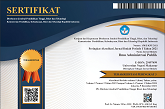The Role of Public Servants in Alleviating Poverty in Indonesia
(1) Sekolah Tinggi Ilmu Administrasi Bandung, Indonesia
(*) Corresponding Author
DOI: https://doi.org/10.26858/jiap.v12i2.45570
Abstract
Poverty remains a persistent issue in Indonesia, and it requires the involvement of various actors, including public servants. This study aims to explore the role of public servants in alleviating poverty in Indonesia. To achieve this goal, a qualitative research method was employed, and data was collected through semi-structured interviews with public servants who work in poverty-alleviation programs. The study found that public servants play a crucial role in poverty reduction efforts by providing access to basic services, including health care and education, and implementing poverty-alleviation programs. However, there are several challenges that public servants face, such as limited resources and bureaucratic obstacles, which hinder their ability to deliver effective services. In conclusion, this study highlights the importance of public servants in poverty reduction efforts and suggests the need for greater support and resources to enable public servants to deliver better services and improve the lives of people living in poverty.
Keywords
Full Text:
PDFReferences
Alkire, S., & Seth, S. (2015). Multidimensional poverty reduction in India between 1999 and 2006: Where and how? World Development, 72, 93–108.
Baloch, M. A., Danish, Khan, S. U. D., & Ulucak, Z. Ş. (2020). Poverty and vulnerability of environmental degradation in Sub-Saharan African countries: what causes what? Structural Change and Economic Dynamics, 54, 143–149. https://doi.org/10.1016/j.strueco.2020.04.007
Bandiera, O., Burgess, R., Das, N., Gulesci, S., Rasul, I., & Sulaiman, M. (2017). Labor markets and poverty in village economies. Quarterly Journal of Economics, 132(2), 811–870. https://doi.org/10.1093/qje/qjx003
Fang, D., Wang, D., & Kleit, A. N. (2020). How a choice between emission trading and tax schemes affects an environment-biased Environmental Protection Bureau’s discretion? Science of The Total Environment, 736, 139141. https://doi.org/https://doi.org/10.1016/j.scitotenv.2020.139141
Feliciano, D. (2019). A review on the contribution of crop diversification to Sustainable Development Goal 1 “No poverty” in different world regions. In Sustainable Development (Vol. 27, Issue 4, pp. 795–808). https://doi.org/10.1002/sd.1923
Gutmann, J., Padovano, F., & Voigt, S. (2020). Perception vs. experience: Explaining differences in corruption measures using microdata. European Journal of Political Economy, 65, 101925. https://doi.org/https://doi.org/10.1016/j.ejpoleco.2020.101925
Ho, S. Y. (2018). Finance-growth-poverty nexus: a re-assessment of the trickle-down hypothesis in China. Economic Change and Restructuring, 51(3), 221–247. https://doi.org/10.1007/s10644-017-9203-8
Ibn-mohammed, T., Mustapha, K. B., Godsell, J., Adamu, Z., Babatunde, K. A., Akintade, D. D., Manufacturing, W., Wmg, G., Cv, C., & Kingdom, U. (2021). Resources , Conservation & Recycling A critical analysis of the impacts of COVID-19 on the global economy and ecosystems and opportunities for circular economy strategies. Resources, Conservation & Recycling, 164(May 2020), 105169. https://doi.org/10.1016/j.resconrec.2020.105169
Laurens, S., & Putra, A. H. P. K. (2020). Poverty alleviation efforts through MDG’s and economic resources in Indonesia. The Journal of Asian Finance, Economics and Business, 7(9), 755–767.
Li, L. (2019). Poverty alleviation through government-led e-commerce development in rural China: An activity theory perspective. In Information Systems Journal (Vol. 29, Issue 4, pp. 914–952). https://doi.org/10.1111/isj.12199
Mahadevan, R., & Hoang, V.-N. (2016). The nexus between poverty and deprivation in Vietnam. Journal of Policy Modeling, 38(2), 290–303.
Mishra, S. B., & Alok, S. (2022). Handbook of research methodology. Educreation publishing.
Miyamoto, M. (2020). Poverty reduction saves forests sustainably: Lessons for deforestation policies. World Development, 127. https://doi.org/10.1016/j.worlddev.2019.104746
O’Hara, P., & Sainato, V. A. (2015). Monetizing the police: Corruption vectors in agency-managed off-duty work. Policy and Society, 34(2), 151–164. https://doi.org/https://doi.org/10.1016/j.polsoc.2015.05.002
Omerzel, D. G., & Gulev, R. E. (2011). Knowledge resources and competitive advantage. Managing Global Transitions, 9(4), 335.
Saleh, C. (2022). Implementasi Pembelajaran Secara Daring Di Sekolah Dasar Era Pandemi Covid-19. Spektrum Analisis Kebijakan Pendidikan, 10(4), 23–36. https://doi.org/10.21831/sakp.v10i4.17785
Santika, T. (2019). Heterogeneous impacts of community forestry on forest conservation and poverty alleviation: Evidence from Indonesia. People and Nature, 1(2), 204–219. https://doi.org/10.1002/pan3.25
Sareen, S. (2020). European energy poverty metrics: Scales, prospects and limits. Global Transitions, 2, 26–36. https://doi.org/10.1016/j.glt.2020.01.003
Wu, Y., Ke, Y., Zhang, T., Liu, F., & Wang, J. (2018). Performance efficiency assessment of photovoltaic poverty alleviation projects in China: A three-phase data envelopment analysis model. Energy, 159, 599–610. https://doi.org/10.1016/j.energy.2018.06.187
Xie, J., & Zhang, Y. (2020). Anti-corruption, government intervention, and corporate cash holdings: Evidence from China. Economic Systems, 44(1), 100745. https://doi.org/https://doi.org/10.1016/j.ecosys.2020.100745
Xu, M. (2021). Resources, Conservation & Recycling 2020 Excellence in Review Awards. Resources, Conservation and Recycling, 167, 105425. https://doi.org/https://doi.org/10.1016/j.resconrec.2021.105425
Yang, Y. (2020). China’s poverty alleviation resettlement: Progress, problems and solutions. Habitat International, 98. https://doi.org/10.1016/j.habitatint.2020.102135
Zhou, Y. (2019). Land consolidation boosting poverty alleviation in China: Theory and practice. Land Use Policy, 82, 339–348. https://doi.org/10.1016/j.landusepol.2018.12.024
Article Metrics
Abstract view : 118 times | PDF view : 24 timesRefbacks
- There are currently no refbacks.
Copyright (c) 2023 Susilawati Susilawati

This work is licensed under a Creative Commons Attribution 4.0 International License.
Diterbitkan oleh:
Program Studi Ilmu Administrasi Publik
Program Pascasarjana Universitas Negeri Makassar
JIAP Index By:

This work is licensed under a Creative Commons Attribution 4.0 International License.









